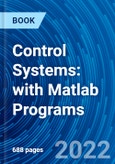In modern era, a control system plays a vital role in human life. A control system is an interconnection of components forming a system configuration in which quantity of interest is maintained or altered in accordance with a desired manner.
This book covers various aspects of control systems like reduction techniques of multiple systems, time response analysis of the three orders of control systems and steady state error of different systems. While delving into the finer details of the subject, the book explains different components of control system like actuators, sensors, etc. As the learners progress with these components, the book explains the stability of control system which affects its performance of control system. The root locus techniques of different systems and their frequency response analysis has been explained in a simple manner. The book has also dealt with stability in frequency domain, review of state variable techniques and also introduces design to the learner.
This book is designed for undergraduate engineering students of different branches in the field of control system. This book strictly follows the syllabus of various universities without sacrificing the basic principles and depth of the subject.
Salient Features
- Easy explanation for better understanding of concepts and basic principles.
- Includes solved problems, most of the problems have appeared in different universities and various competitive examinations such as GATE, IES,etc
- More than 150 objective type questions with answers.
- Offers a supplement which emphasizes modeling and the design process using MATLAB to read and initiate to start building the programs.
- Better explanation of concepts and basic principles.
Table of Contents
- Introduction to Control System
- Reduction of Multiple Subsystems
- Time Response Analysis
- Steady State Errors
- Control System Components
- Stability of Control System
- Root Locus Technique
- Frequency Response Analysis
- Stability in Frequency Domain
- Introduction to Design
- Review of State Variable Technique
Index
Author
Sonveer Singh:- completed his B.E. in Electrical and Electronics Engineering with honours in 2003 from Dr. B.R. Ambedkar University, Agra and M.Tech. in Engineering System in 2006 from the Dayal Bagh Educational Institute, Agra. He completed his PhD in Electronics and Communication Engineering in 2016 from S.V.S. University, Meerut. He is Senior Lecturer, in Electronics Engineering, the Technical Education Department, Government of Uttar Pradesh. He has published more than 10 research papers published in different international journals and conferences like International Journal of Solar Energy, International Journal of Energy Conversion and Management (Elsevier), IEEE, etc. His fields of interest include control systems, network analysis and synthesis, analog and digital electronics and soft computing applications in electrical load forecasting, economic dispatch, fuzzy system, photovoltaic thermal system, etc.
Sanjay Agrawal:- is a Professor, Electrical Engineering, School of Engineering and Technology, IGNOU, New Delhi. He is the recipient of the prestigious Bhaskara Solar Energy Fellowship from the Indo-US Science and Technology Forum (IUSSTF) and the Department of Science and Technology (DST), India. This led him to his post-doctoral fellowship at Smart Grid Energy Research Centre, University of California, Los Angeles (UCLA), USA. Prof. Agrawal obtained his PhD from Indian Institute of Technology, Delhi. He has 20 years of teaching and research experience with specialization in electrical engineering. He has published more than 75 papers in international journals and authored two books. He has also published a patent, titled 'Improved Hybrid Solar Collector'.
His industrial experience includes working with MNCs like Johnson Control (I) Pvt Ltd. He has worked on projects like 'improved hybrid solar cooker' and ' greenhouse dryer' funded by TEQIP through CSVTU, Bhilai. He has guided 8 PhD scholars so far and is a member of editorial board and panel of reviewers of reputed international journals.
He has also developed two massive open online courses (MOOCs) one on 'Principles of Electrical Science' and the other on 'Renewable Energy Technologies and Their Uses' which are available on SWAYAM.








